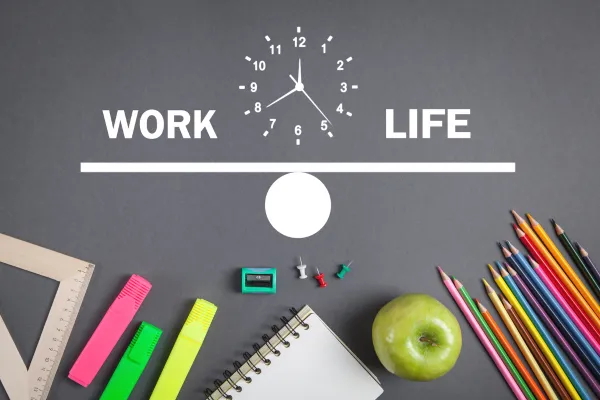

7 Challenges to Achieving a Work-Life Balance (and How to Overcome Them)
In the fast-paced world we live in, finding the balance between work and life can feel like attempting to walk on a tightrope. Whether you're a seasoned professional, a parent, or someone just trying to keep all the pieces working together, you're not alone in facing the challenges of achieving a work-life balance. Together, let’s explore some common hurdles and learn practical tips on how to overcome them.
Challenge 1: The Time Crunch Dilemma
Time is that commodity we all wish we had more of so that we can do all that we need (and want) to do at a given moment. The demands of work, family, and personal obligations can leave you feeling like there's barely a moment to breathe. The only way you can tackle the time crunch is by embracing the power of prioritization.
Here’s how to prioritize:
Start by identifying your most critical tasks, both at work and in your personal life. What absolutely must be done today and what can wait?
Focus on the most critical and what truly matters – allocate your time more efficiently from the most critical down to the less important tasks.
Leave room for activities that bring you joy and relaxation.
Challenge 2: The Perils of Overcommitment
You may be unable to resist the temptation to say "yes" to every request that comes your way. While being a team player is commendable, overcommitting can lead to burnout. It's time to become a master of graceful decline. Politely but firmly decline tasks or invitations that don't align with your priorities or contribute to your well-being.
Remember, saying "no" is not a sign of weakness; it's a strategic move to protect your time and energy. By setting boundaries, you'll find that you have more room to excel in the areas that you are truly skilled at and that matter most to you.
Challenge 3: The Always-Connected Conundrum
In our hyper-connected world, the boundary between work and personal life often blurs, thanks to smartphones and remote work. While technology has undoubtedly improved our lives, it's crucial to establish clear boundaries to prevent work from encroaching on your personal time.
Consider setting specific "no-work" hours, turning off email notifications during evenings, and creating a dedicated workspace if you're working from home. By creating a clear separation between work and personal life, you'll be better able to unwind and recharge.
Challenge 4: The Uninvited Guest – “Guilt”
You may feel guilty for taking a break or saying "no" at work. Guilt is a common emotion that many of us grapple with, but it's essential to recognize its counterproductive nature. Taking breaks and setting boundaries isn't selfish; it's an act of self-preservation.
Combat guilt by reminding yourself that a well-rested and fulfilled you is more productive and present in all aspects of life. Treat self-care as a non-negotiable, just like any other responsibility.
Challenge 5: FOMO (Fear of Missing Out) on Career Opportunities
The fear that taking a step back from work might mean missing out on career advancements is real. However, it's essential to challenge the notion that success can only be achieved through constant hustle. Remember that sustainable success involves taking care of yourself and finding a balance that works for you.
To overcome FOMO, communicate openly with your supervisors about your boundaries and explore flexible work arrangements. Many employers now recognize the importance of work-life balance and may be more accommodating than you think.
Challenge 6: Lack of Support and Communication
Achieving work-life balance isn't a solo mission. It requires support from both your workplace and your personal network. If you're feeling overwhelmed, don't hesitate to communicate your needs with your colleagues, supervisors, or loved ones.
Initiate conversations about workload, expectations, and potential adjustments that can be made to better support your well-being.
Challenge 7: Unrealistic Personal Expectations
Sometimes, we are our harshest critics. Unrealistic expectations of perfection in both our professional and personal lives can be a major obstacle to achieving balance. It's essential to redefine what success looks like for you and acknowledge that it doesn't have to mean doing everything perfectly all the time.
Give yourself permission to be imperfect, celebrate small victories, and recognize that life is a journey of continuous learning and adaptation. Embracing a growth mindset allows you to view challenges as opportunities for development rather than failures.
Achieving work-life balance is an ongoing process that requires self-awareness, prioritization, and the courage to set boundaries. Remember, finding a work-life balance is a personal journey that may change over time. So, take a deep breath, assess your priorities, and start making intentional choices that will lead you to a more balanced and joyful life.
ABOUT US

Jeanne Prinzivalli
Therapist + Coach
I help ambitious, anxious women learn how to trust and put themselves first, so they can stop burning themselves out trying to meet other people's expectations.
SELF CARE CONTINUUM
CLIENT LINKS
LET'S CONNECT
Let’s get you started on relief from self-sabotaging patterns so you can move forward with your life and career passions.
Self Care Continuum Copyright © 2023.




